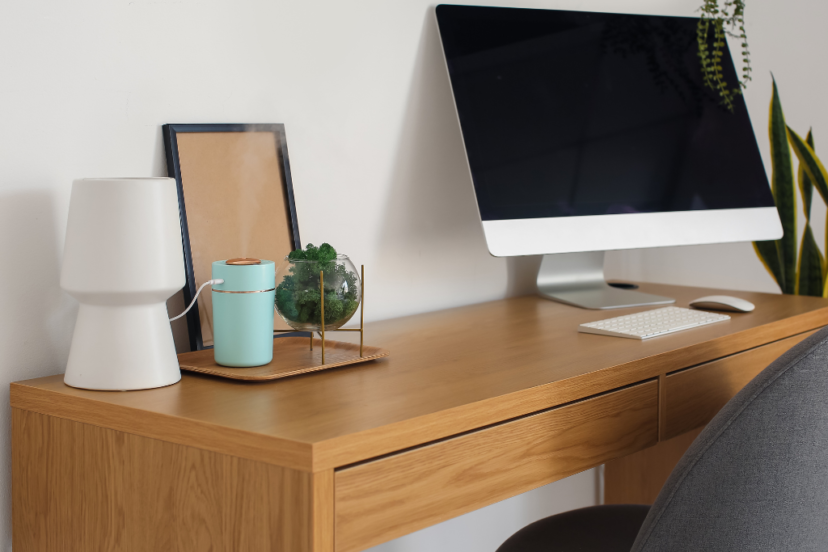Desk Humidifiers: The Ultimate Guide to Choosing, Using, and Maintaining for Optimal Air Quality
"We may earn a commission for purchases made using our links. Please see our disclosure to learn more."
What are Desk Humidifiers?
Desk humidifiers are designed to add moisture to the air, which can be especially beneficial during dry months or in areas with low humidity. There are different types of desk humidifiers available, including ultrasonic, evaporative, and cool mist humidifiers.
Ultrasonic humidifiers use high-frequency vibrations to turn water into a fine mist that is released into the air. These humidifiers are quiet and energy-efficient, making them ideal for use in a bedroom or office. Evaporative humidifiers use a fan to blow air through a wick or filter that has been soaked in water. As the air passes through the wet filter, it picks up moisture and releases it into the air. Cool mist humidifiers use a fan to blow air through a wick or filter, but instead of heating the water, they use a cool mist to add moisture to the air.

How to Choose the Right Desk Humidifier
Choosing the right desk humidifier depends on several factors. Here are some things to consider when choosing a desk humidifier:
Room Size
Consider the size of the room where you will be using the humidifier. Desk humidifiers are designed for small spaces, so if you need to humidify a larger room, you may need to consider a larger humidifier.
Type of Humidifier
As mentioned earlier, there are different types of humidifiers available. Consider which type of humidifier will work best for your needs. Ultrasonic humidifiers are ideal for quiet spaces, while evaporative humidifiers work well in larger areas. Cool mist humidifiers are good for those who live in warmer climates.
Capacity
The capacity of the humidifier refers to how much water it can hold. A larger capacity means that the humidifier can run for a longer time without needing to be refilled. However, a larger capacity also means that the humidifier will be larger and take up more space on your desk.
Maintenance
Consider how easy it is to clean and maintain the humidifier. Some humidifiers require frequent cleaning and filter replacement, while others are easier to maintain.
Noise Level
If you plan to use the humidifier in a quiet space, consider the noise level. Ultrasonic humidifiers are generally the quietest, while evaporative humidifiers can be noisier due to the fan.
ULTRASONIC HUMIDIFIER DESKTOP HUMIDIFIER FAN NO MIST EVAPORATIVE HUMIDIFIER
How to Use a Desk Humidifier
Using a desk humidifier is simple. Here are the steps to follow:
- Fill the humidifier with water according to the manufacturer’s instructions.
- Turn on the humidifier and adjust the settings as needed.
- Monitor the water level and refill as needed.
It is important to note that humidifiers should be used with distilled water to prevent the buildup of mineral deposits. Tap water contains minerals that can be released into the air and cause respiratory problems.
| Maintenance Tips | Description |
|---|---|
| Regular Cleaning | Clean the humidifier regularly according to the manufacturer’s instructions. This may include emptying the water tank, wiping down the interior, and replacing the filter. |
| Use Distilled Water | Use distilled water instead of tap water to prevent the buildup of mineral deposits. |
| Change the Water Daily | Change the water in the humidifier daily to prevent the growth of bacteria and mold. |
| Replace Filters | If your humidifier has a filter, replace it regularly according to the manufacturer’s instructions. |
| Store Properly | When storing your humidifier, make sure it is completely dry to prevent the growth of mold and bacteria. |
Maintaining Your Desk Humidifier
Proper maintenance is important to keep your desk humidifier working effectively and to prevent the growth of bacteria and mold. Here are some tips for maintaining your humidifier:
Regular Cleaning
Clean the humidifier regularly according to the manufacturer’s instructions. This may include emptying the water tank, wiping down the interior, and replacing the filter.
Use Distilled Water
As mentioned earlier, use distilled water instead of tap water to prevent the buildup of mineral deposits.
Change the Water Daily
Change the water in the humidifier daily to prevent the growth of bacteria and mold.
Replace Filters
If your humidifier has a filter, replace it regularly according to the manufacturer’s instructions.
Store Properly
When storing your humidifier, make sure it is completely dry to prevent the growth of mold and bacteria.
Benefits of Using a Desk Humidifier
Using a desk humidifier can have several benefits, including:
Alleviating Dry Skin
Dry air can cause skin irritation, especially during the winter months. A humidifier can add moisture to the air, which can help alleviate dry skin.
Reducing Respiratory Problems
Dry air can cause respiratory problems, such as asthma and allergies. A humidifier can add moisture to the air, which can help reduce respiratory problems. This can be especially beneficial for those who suffer from chronic respiratory conditions.
Protecting Wooden Furniture
Dry air can cause wooden furniture to crack and warp. A humidifier can add moisture to the air, which can help protect wooden furniture.
Improving Sleep
Dry air can cause snoring and other sleep problems. A humidifier can add moisture to the air, which can help improve sleep quality.
Risks of Using a Desk Humidifier
While using a desk humidifier can provide many benefits, there are also potential risks to be aware of. Over-humidifying a room can cause mold and bacteria growth, which can be harmful to your health. It is recommended to keep the humidity level between 30 and 50 percent to prevent these issues.
Personal Experience: Choosing the Right Desk Humidifier
When I first started working from home, I noticed that the air in my office was very dry, which made it hard to work for long periods of time. I decided to invest in a desk humidifier to help solve the problem.
After doing some research, I found that there are many different types of humidifiers available on the market, each with their own pros and cons. I ultimately decided to go with a cool mist humidifier, as it was the most affordable option and didn’t require as much maintenance as a warm mist humidifier.
I also made sure to choose a humidifier with a large enough tank to last me throughout the workday, so I wouldn’t have to constantly refill it. The humidifier I chose had a 2-liter tank, which was perfect for my needs.
Overall, I found that investing in a desk humidifier was a great decision. Not only did it help improve the air quality in my office, but it also helped me feel more comfortable and focused throughout the day.
Pros and Cons
Here are some pros and cons of using desk humidifiers:
Pros
- Alleviates dry skin
- Reduces respiratory problems
- Protects wooden furniture
- Improves sleep quality
Cons
- May require frequent cleaning and maintenance
- Can be noisy
- May take up space on your desk
Frequently Asked Questions
Q: Can I use tap water in my desk humidifier?
A: It is recommended to use distilled water to prevent the buildup of mineral deposits. Tap water contains minerals that can be released into the air and cause respiratory problems.
Q: How often should I clean my desk humidifier?
A: You should clean your humidifier regularly according to the manufacturer’s instructions. This may include emptying the water tank, wiping down the interior, and replacing the filter.
Q: Can a desk humidifier make the air too humid?
A: Yes, it is possible to over-humidify a room. It is recommended to keep the humidity level between 30 and 50 percent.
Insider Tips
- To prevent mold and bacteria growth, make sure to clean your humidifier regularly and use distilled water.
- If you plan to use the humidifier in a quiet space, choose an ultrasonic humidifier.
- To save space on your desk, consider a smaller capacity humidifier that can be refilled more frequently.
- If you have wooden furniture in your room, using a desk humidifier can help protect it from damage.
Conclusion
Desk humidifiers are a simple solution to alleviate dry air problems. When choosing a desk humidifier, consider the room size, type of humidifier, capacity, maintenance, and noise level. Using a desk humidifier is simple, and proper maintenance is important to keep it working effectively. The benefits of using a desk humidifier include alleviating dry skin, reducing respiratory problems, protecting wooden furniture, and improving sleep quality. However, it is important to be aware of the potential risks of over-humidifying a room. With the right desk humidifier and proper usage, you can enjoy optimal air quality in your personal space.








